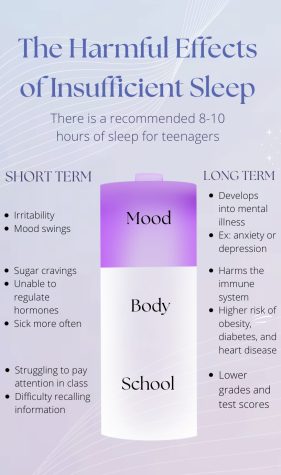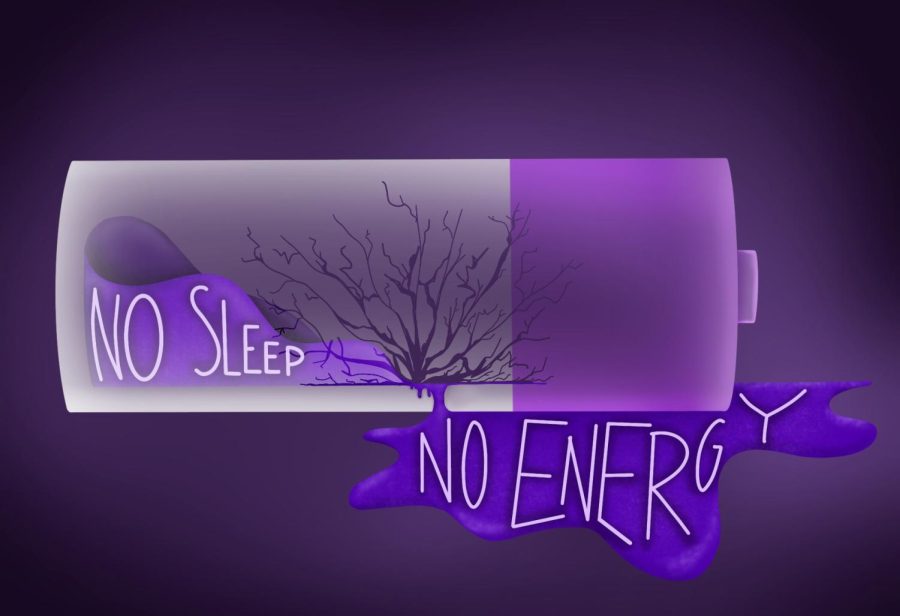School versus sleep: Which is more important?
Sleep deprivation in teenagers causes them to lose energy and motivation.
April 18, 2022
As the bell rings to begin first period at 7:25, bleary-eyed teenagers stumble over their feet into the classrooms. Many of them then lay their heads down and close their eyes due to the lack of sleep from the night before. For teenagers, attending school and their after school activities leave little time for sleep. Teens tend to spend their free time with friends, working on homework, playing sports, or attending a job despite being sleep deprived.
For teens, this adds up to a lack of sleep. If a student is spending eight hours at school, five hours at work, and then two hours at work there is not much time left for sleep. Sleep is essential for teenagers’ development and well-being. Teenagers’ physical, emotional, and mental health rely on getting enough sleep. So why does school start so early?
“The teenage brain is not fully awake until nine o’clock,” health teacher Ashley Hartke said.
The National Sleep Foundation and the American Academy of Sleep Medicine both agree that teenagers need eight to 10 hours of sleep. Sleep benefits teens by maintaining their physical health, emotional well-being, and school performance. Factors like homework, jobs, and social media, however, make it difficult for many teens to get enough sleep.
These factors make it difficult to sleep because of the time pressure they take up. Teenagers may sacrifice their sleep to finish their homework or study. Instead, the best thing a teenager can do for themselves is to sleep. Sleeping allows the brain to recharge and reset itself. The process of resetting the mind through sleep promotes attention, memory, and thinking. During sleep the brain is able to recognize and process through the most important information to consolidate learning.
Based on an article from Scholastic Choices, reversing sleep deprivation is not possible. Catching up on sleep during the weekend or taking a nap does not fix one’s sleep cycle.
“If you get enough sleep then you feel more content, and you feel dreadful if you do not sleep as much,” junior Sara Hasan said.
The constant cycle of too little, or too much sleep may be due to or develop into mental health issues. Anxiety, depression, and bipolar disorder are the main mental health issues linked to poor sleep. With bipolar disorder people switch between an elevated state of pure joy called mania that lasts days, to a depressed mood that lasts weeks. Symptoms of depression and bipolar disorder is the lack of sleep.

The frontal lobe of the brain controls impulsive behavior that sleep deprivation can harm the development of. This section of the brain is still developing in young adolescents which is why sleep is crucial.
Studies have found that teens who do not get enough sleep are at higher risk to engage in risky behaviors. These behaviors can be texting while driving, failing tests, and even drug and alcohol abuse.
According to the National Library of Medicine, teens who do not get enough sleep are at a higher risk of injuries and getting into vehicle crashes. Physical symptoms of sleep deprivation can affect teenangers’ safety, emotional well-being, and academic performance.
The factors behind a lack of sleep in teens varies among each person. For all teenagers, their sleep drive builds slower. The hormone melatonin also takes longer to produce that promotes sleep.
“Biology is an issue because sleep cycles change,” Hartke said. “Melatonin is a hormone that makes you sleepy and gets released much later in teens. That is why teens can stay up longer at night, but since melatonin gets released later in a teen it stays in the body longer.”
All 36 different high schools in DuPage County vary start times that range from 7 a.m. to 8 a.m. For District 204’s 7:25 a.m. start time is one of the earliest compared to other districts in the County. District 203 high schools start at 7:45 a.m. while District 86, located in Hinsdale starts at 8:00 a.m.
This early start time results in students waking up around 5 a.m. to 6 a.m. to ensure that they have enough time to get ready for school.
“It depends on how much school work I have but usually I get seven or seven and a half hours of sleep,” Hasan said.
Since sleep is so beneficial to teenagers’ development the question lingers: Why does high school start earlier compared to the middle, and elementary schools in DuPage County?
“Ideally, elementary school students should start earlier because they go to bed much earlier, ” Hartke said, “They get tired earlier, and can wake up earlier full of energy.”
The lack of sleep in students is noticeable as they walk through the halls. Under eye bags and a negative mood can be symptoms of poor sleep the night before. A factor to consider though in the debate is that the early arrival time allows high school students in DuPage county to get out of school first. For District 204, students leave at 2:25 p.m. or 2:05 p.m. on Wednesdays.
The early dismissal time allows teens to have more freedom. Students use this time after school to do homework, go to work, play sports, or hang out with their friends. These activities can be time-consuming which is why the early dismissal time is ideal for high school students.
District 204 is a large district so making those abrupt changes would be difficult. In the future, it may be possible for schools to change the bell schedules so that elementary school starts first, and high school starts last. This switch would ensure that high school students get enough sleep.
Unlike teenagers, younger children are able to wake up earlier but should also get eight to nine hours of sleep. School times should be pushed back to ensure that all students, no matter what age are able to wake up for school.
“Creating a calm environment tells your body it is time for sleep,” Hartke said.
Improving sleep starts by creating a pre-bed routine that promotes productivity or relaxation. This can include taking a shower, a skincare routine, reading a book, or journaling. There are other methods out there, but staying away from the phone is the goal when getting ready for bed.
“Look at what you can do to be more relaxed and get restful sleep, ” Hartke said. “Sleep routines are important. You need to train your body that when you do these activities that means you are going to bed.”
Teenagers can find this difficult because of the main problem, the phone. Phone usage is one of the leading factors in teenagers when it comes to poor sleep. Their brain becomes wired to the technology that disrupts their sleep schedule and the production of melatonin. Teenagers find this advice difficult to follow, but it is necessary to do so to improve sleep.
“I am usually on my phone at night for 30 minutes to an hour so that is why I get seven hours of sleep,” Hasan said.
The first step to getting better sleep is to stop using the phone at least thirty minutes before bed. Keep the phone on, do not disturb or turn off the ringer. Another step could be leaving the phone in a different room.
Putting the phone away does not work for some teenagers. Instead of scrolling all night it can be beneficial to listen to quiet music or rain sounds at night. Similar to this, others find that listening to and watching ASMR videos help them relax, and sleep at night.
Despite these benefits and distractions, everyone has their own way of sleeping. Nighttime routines will look different to other teens’, but sleep is essential for them.
“Look at where you can make changes in your schedule to allow more time to sleep at night,” Hartke said.
Sleep is how humans recharge themselves like a battery. When teens go to sleep the body, and mind resets themselves. Ignoring sleep is not an option because sleep keeps the physical, mental, and emotional aspects of teenagers’ lives in check.
“Sleep is the most important because it is a part of health. Health is more important than anything else, Hartke said, “If you are not prioritizing sleep, then it is going to snowball effect of you struggling in school. Both are important but the priority should be on sleep so you can be academically successful.”
There are a lot of avoidable factors that prevent teenagers from getting enough sleep. Factors that teens can not avoid though are work schedules, and homework. These specific factors are difficult to avoid because they are the most important for teenagers to do. There is no clear answer to the debate over if school or sleep is more important. Both should be a priority in students’ lives, but do not sacrifice one for the other.
Without enough sleep, teenagers’ performance in school or at work will decrease since their minds, and bodies are not at one hundred percent.
For all the teenagers out there, go to sleep. Do not be the person who lives a one percent life.










Jen • Apr 18, 2022 at 11:34 pm
Very good information. Great job! Like the reminder to stay off electronics 30 minutes before bed and pre bedtime routine.